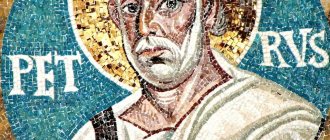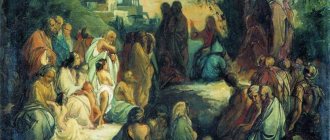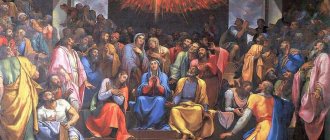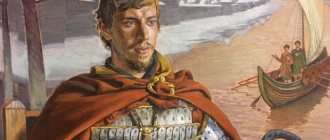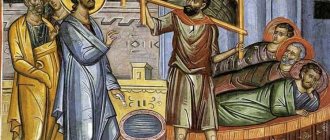Christianity is a religion of paradoxes. The blessings of God and salvation in other faiths are received by the clear executor of heavenly regulations. And Christianity was the first to let a bandit into Paradise. The first to enter the Kingdom of God was not a bishop, not a reverend monk, but a robber. He got there not for his merits on the high road, but for his sincere desire not to make such merits. What is known about this person?
The story of a prudent robber
Every evangelist, when describing Golgotha, talks about two thieves who were crucified at the same time as Christ. To the left and right of the Savior there were two more crosses, Gestas and Dismas hung on them.
The story of Dismas, which in ancient Russian tradition is called Rakh, is sad. Born into a family of robbers, he lived on the way to Egypt, did not hear the preaching of Jesus Christ, did not see any of God's miracles: healings, multiplication of loaves.
There is a legend that Rach saved the lives of the Holy Family on the way to Egypt. Robbers attacked travelers who were fleeing from Herod. Only the unusual beauty of the Infant God struck the leader. He ordered his comrades to release the fugitives and heard the prophecy of the Blessed Virgin that in years to come the Child would reward his rescuer, the robber.
Only this word also means “rebel, terrorist,” and in the first century theft was not punishable by crucifixion. Church theologians suggest that the Jews, hanging next to the Lord, waged an armed struggle against the occupiers - the Romans . They were more partisans, rebelling against the Roman Empire, rather than stealing and robbing civilians.
What would the saved thief who was crucified with Jesus say to you today?
Telegram channel @ieshua.org
Two thieves were crucified with Jesus on Good Friday. They hung there, naked, in shame and agony, on painful crosses, for about six hours. At first they blasphemed, spewing vicious insults at Him. Their names are not mentioned. In the end, one was saved and the other was lost. One was forgiven, the other was condemned. One ascended to heaven, the other went to destruction. The heart of one was hardened by hatred, the heart of the other was softened by love. One cursed God with his last breath, the other whispered a soul-saving prayer.
Why did it happen this way? Why did one of them change his thoughts and believe in Christ? One plausible explanation is that when he saw Jesus forgive His murderers, it made a deep impression on him. His eyes opened, and he realized that in front of him was not just a person. He had never seen such a strong display of love. In one of the phrases he spoke on the cross, Jesus prayed: “Father, forgive them, for they know not what they do.” (Luke 23:34).
This prayer was not only for the religious leaders who plotted His murder, not only for the Jews who approved of it, and not only for the Romans who carried it out, but for every fallen person whose sins made crucifixion necessary. Because our sins brought Jesus to the cross, we were also the enemies He forgave and died for. The great preacher Charles Spurgeon said, “Let us go up to Calvary to find out how we can be forgiven. And then let's stay there to learn how to forgive."
The cursing thief was so touched by the kindness of Jesus that his heart was awakened to the belief that he too could be saved. He uttered a simple, heartfelt eight-word prayer that changed his entire destiny: “Lord, remember me when You come into Your kingdom” (Luke 23:42). Author Max Lucado notes, “The only thing more absurd than his request was the fact that it was granted...he who deserved hell got heaven.”
The only thing that united Jesus and the thief was the method of their execution. One was a common criminal, the other was the judge of the whole world. One was as guilty as a sinner, the other was the most innocent person on Earth. When the thief asked him to remember him, Jesus replied: “Truly I tell you, today you will be with me in paradise” (Luke 23:43). And this thief, although crucified for his crimes on earth, is now free in heaven through the power of forgiveness. What Jesus said to this thief is a message of hope for all of us. If Jesus forgave His own murderers, He will forgive us. If Jesus saved the dying thief, He will save us too. My friend, there is no sin so terrible that the blood of Jesus cannot atone for it, and no mistake too great for the mercy of God.
The Gospel story about the redemption of the thief answers the question: “Is there such a thing as dying repentance?” Undoubtedly! Do I recommend this? No way! Why would God give you crumbs in your life instead of the best? Why burn God will save anyone who prays with true repentance and faith even at their last breath. But who can say that such an opportunity will ever arise again in this person’s life? He may die suddenly and be lost forever. This is why the Bible emphatically declares: “Behold, now is the accepted time, behold, now is the day of salvation.” (2 Corinthians 6:2). Friend, don't risk your soul. Why play dice with eternity? Call on God now. He will save your soul and change your life completely.
In 1871, Dwight L. Moody preached a sermon entitled “What Should I Do with Jesus?” At the end of his sermon, he asked his congregation (the largest church in Chicago at the time) to spend a week pondering the issue and come back the following Sunday with a decision made. By his own admission, Moody called it the greatest mistake ever made during his ministry. On that very day, the Great Chicago Fire tore through the city, killing more than 300 people, destroying more than a thousand buildings, including Moody's church building, and leaving thousands homeless. Some people from his flock also died. Afterwards he said: “What a mistake that was! Since then, I don’t dare give people a week to think about their salvation... Now is the time.” Afterwards he said that he would give his right hand to fix everything.
If the redeemed thief could speak to us today, he might say, "Don't wait until the last day of your life to be saved." It is much better to serve God and give Him your best years rather than your last remaining days. Another author about Two thieves were crucified with Jesus. One is now glorified with Him. We can share the same fate. We don't have to die in our sins. Our decisions determine our destiny.
Fate is not a matter of chance, it is a matter of choice! The dying robber changed his eternal destiny by making the right choice. And we are also capable of this. Isn't it amazing how much we can learn from the thief?
Author - Ben Godwin / charismamag.com Translation - Alexandra Kovalchuk for
Donate Last: 02/28. Thank you!
Subscribe: Telegram • Facebook • • • Twitter • Instagram • Youtube
More on the topic:
- Why many Christians do not understand the essence of Christianity
- The cross is not just about God's love
- In the Book of Life forever
- Three Lessons from David's Fall and Forgiveness
Three exploits of a robber
The Lord who hung on the Cross was reviled by the crucifiers, mocked by the high priests and the common people. The fellow in misfortune, the robber, who was hanging on the left, slandered: what kind of God is this if he does not save himself? The crucified one on the right has a different dispensation. The Holy Fathers believe that the prudent thief went to Paradise for three exploits:
- Feat of faith. Dismas did not learn to read and write, did not read prophecies and did not see Christ’s miracles, but he saw God incarnate in a man doomed to death
- Feat of love He himself suffered and died from unbearable pain, but showed compassion for another, for Christ.
- A feat of hope. The robber did not despair of the Savior’s almighty love. He understood that he was not worthy of the Heavenly Kingdom for his earthly deeds, but he dreamed that God would not remember him,
The thief entered the Kingdom of God because he was able to repent: “I accept what is worthy of deeds.” Realize on the cross the wrongness of your life, open your heart to the Lord . God entered his soul, crying over his sins, and gave the faithful hope that Heaven is open for those who repent. (Matt. 21:28–32)
Imaginary righteous
The fact is that, by and large, we are all sinners in approximately the same quantity and size, if we conditionally weigh our sins on scales. Earthly life can be considered like the first grade at school, or, more accurately, the preparatory group in kindergarten. Of course, in the first grade there are excellent students and C students, there are even future D students, but if you look at these first-graders from the height of the graduating class, then they are all nice children, their knowledge and sins (that is, ignorance) are still insignificant and therefore easily corrected. The main result of primary education should be the desire of children to study further - this, in fact, is the main task of teachers at the first stage of education - not to discourage children from going to school and learning.
Approximately the same thing happens to a person in earthly life, but the main thing that should come to him at a certain stage, at the stage of his spiritual maturation, is the desire to live further without sins, honestly and purely, without a stone in his bosom, that is, deep repentance with an uncontrollable desire to improve and correct the consequences of one’s earthly sins.
Often people in worldly life consider themselves not very sinful and therefore the feeling of repentance is not even familiar to them. They die like righteous people: they judge and condemn everyone, they set their righteous and successful life as an example to everyone. You are probably familiar with these. It is easy to guess where the Lord will place them for correction. With a robber the situation is completely different.
In which country is the mountain located?
Strictly speaking, Golgotha is not a mountain, but a hill in Israel, in the city of Jerusalem. But the spiritual height for every Christian who climbs this hill is incommensurable with any other height in this world. After all, it was on Golgotha, according to the Gospel (Matthew 27:33-38, John 19:17-18) that the Savior was crucified.
Iconography: Crucifixion Dates: XVIII century. Material: wood, tempera. Dimensions of the icon: height 31 cm, width 25.9 cm Icon with a shallow ark. The composition is multi-figured. In the center, on an eight-pointed cross, is the smoothly curved figure of the crucified Christ. The upcoming ones are located on the sides. Behind the upcoming figures is a faded green city wall. Above the cross are two weeping angels. Faces: light brown swirl with olive sankhir highlights. The colors of the clothes are reddish brown, green, blue. Inscriptions, background, halos, cutting of warriors' armor: gilding. Inv. No. KXM KP 3389 DRI 50. Kostroma State Historical, Architectural and Art Museum-Reserve.
According to legend, the crucifixion of Jesus Christ
took place in the very place where
the first man Adam was buried in ancient times. Early Christian authors
, for example
Jerome the Blessed
, wrote that
the blood of Christ
flowing from the cross through a crack in the rock reached the head and bones of the forefather Adam, washed them, thereby cleansing them.
Interesting fact
That is why at the base of the Crucifixion in churches you can see a human skull - this is Adam’s head.
Meaning of the word
The word “Golgotha” itself (Greek Γολγοθάς) comes from the Aramaic gûlgaltâ
("scull"). Perhaps the shape of the mountain evoked such associations in ancient times. There is a version that once upon a time criminals were beheaded at this place, then the word Golgotha means the Place of Execution.
The people did not wait for the Messiah
Photo: Radiovera.ru Why did those people who followed the Lord in crowds, saw the miracles that He performed for them, suddenly turn away from him so easily? Why didn’t they shout down the crowd that was sending Him to death?
Perhaps, and this is one of the versions, He did not live up to their expectations. The Jews believed that He was the Messiah who would become a leader, free Israel from the power of the pagans, make it great and the whole world would respect their state. But instead of taking power from King Herod by force and expelling the Romans who enslaved the Israelites, Christ called the Jews to repentance and prayer. He preached humility and mercy, not war and violence.
As a result: those who a few days ago at the entrance to Jerusalem shouted “Hosanna to the son of David”, a few days later shouted “Crucify, crucify Him!” at the palace of the governor Pontius Pilate.


